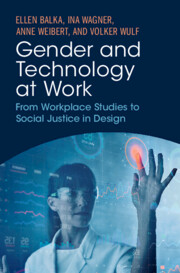Book contents
- Gender and Technology at Work
- Gender and Technology at Work
- Copyright page
- Contents
- Preface
- 0 Introduction
- Part I Gender and Technology
- 1 Gender and Technology
- 2 The Ethical-Political Perspective
- 3 Pathways to a Gendered and Intersectional Perspective
- Part II Gender and Technology at the Workplace
- Part III Gender and Design
- Postscript
- References
- Index
1 - Gender and Technology
A Historical Perspective
from Part I - Gender and Technology
Published online by Cambridge University Press: 28 March 2024
- Gender and Technology at Work
- Gender and Technology at Work
- Copyright page
- Contents
- Preface
- 0 Introduction
- Part I Gender and Technology
- 1 Gender and Technology
- 2 The Ethical-Political Perspective
- 3 Pathways to a Gendered and Intersectional Perspective
- Part II Gender and Technology at the Workplace
- Part III Gender and Design
- Postscript
- References
- Index
Summary
This chapter goes back to the feminist discourse on science/technology and gender, which started in the 1960s and 1970s and was led by women scientists. Feminists criticized the gender binary and other dualisms and brought forward an understanding of ‘scientific objectivity’ as being rooted in the multiplicity of experiences. Feminist criticism of science and technology was later enriched by queer theory and a focus on intersectionality. Of particular influence on a feminist approach to science and technology were feminist standpoint theory and, connected with it, Donna Haraway’s notion of ‘situated knowledge’. In an STS tradition, Cynthia Cockburn analyzed the gendering of technologies – or the mutual shaping of gender and technology. Researchers in the field of cultural studies have followed the STS tradition with empirical studies of how gender plays out in activities such as radio tinkering or in makerspaces. One of the important insights on the way to a gender/intersectional perspective on design is Faulkner’s work on engineers and her understanding that the gendering that occurs in engineering practices is complex and heterogeneous.
- Type
- Chapter
- Information
- Gender and Technology at WorkFrom Workplace Studies to Social Justice in Design, pp. 25 - 49Publisher: Cambridge University PressPrint publication year: 2024



